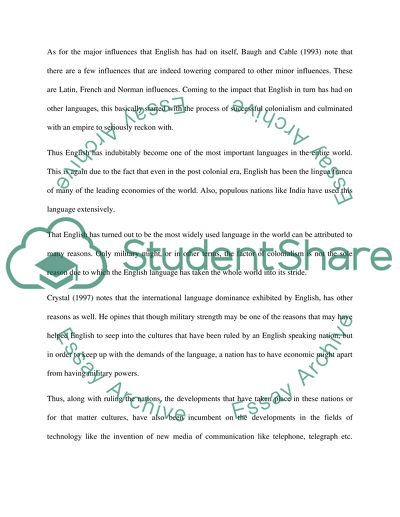Cite this document
(“Take the topic of 1(foreign)language and analyse how much it has been Essay”, n.d.)
Take the topic of 1(foreign)language and analyse how much it has been Essay. Retrieved from https://studentshare.org/journalism-communication/1595970-take-the-topic-of-1foreignlanguage-and-analyse-how-much-it-has-been-influenced-by-current-and-continuing-spread-of-eng-evaluate-wether-effects-of-this-influence-are-a-good-or-a-bad-thing-4-athe-foreign-language-bthe-countryies-where-they-are-spoken
Take the topic of 1(foreign)language and analyse how much it has been Essay. Retrieved from https://studentshare.org/journalism-communication/1595970-take-the-topic-of-1foreignlanguage-and-analyse-how-much-it-has-been-influenced-by-current-and-continuing-spread-of-eng-evaluate-wether-effects-of-this-influence-are-a-good-or-a-bad-thing-4-athe-foreign-language-bthe-countryies-where-they-are-spoken
(Take the Topic of 1(foreign)language and Analyse How Much It Has Been Essay)
Take the Topic of 1(foreign)language and Analyse How Much It Has Been Essay. https://studentshare.org/journalism-communication/1595970-take-the-topic-of-1foreignlanguage-and-analyse-how-much-it-has-been-influenced-by-current-and-continuing-spread-of-eng-evaluate-wether-effects-of-this-influence-are-a-good-or-a-bad-thing-4-athe-foreign-language-bthe-countryies-where-they-are-spoken.
Take the Topic of 1(foreign)language and Analyse How Much It Has Been Essay. https://studentshare.org/journalism-communication/1595970-take-the-topic-of-1foreignlanguage-and-analyse-how-much-it-has-been-influenced-by-current-and-continuing-spread-of-eng-evaluate-wether-effects-of-this-influence-are-a-good-or-a-bad-thing-4-athe-foreign-language-bthe-countryies-where-they-are-spoken.
“Take the Topic of 1(foreign)language and Analyse How Much It Has Been Essay”, n.d. https://studentshare.org/journalism-communication/1595970-take-the-topic-of-1foreignlanguage-and-analyse-how-much-it-has-been-influenced-by-current-and-continuing-spread-of-eng-evaluate-wether-effects-of-this-influence-are-a-good-or-a-bad-thing-4-athe-foreign-language-bthe-countryies-where-they-are-spoken.


